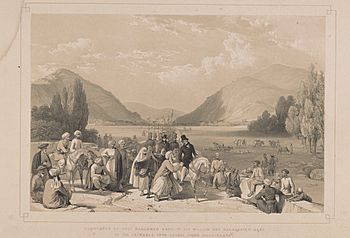Parwan Campaign (1840) facts for kids
Quick facts for kids Parwan Campaign |
|||||||
|---|---|---|---|---|---|---|---|
| Part of First Anglo-Afghan War | |||||||
|
|||||||
| Belligerents | |||||||
| Emirate of Kabul Kohistani Rebels |
Durrani Kingdom |
||||||
| Commanders and leaders | |||||||
| Dost Mohammad Khan Mohammad Afzal Khan Mir Masjidi Khan |
Robert Sale Percival Lord † Fraser (WIA) Edward Connolly † Ponsonby (WIA) Timur Mirza |
||||||
| Strength | |||||||
|
400 according to Dalrymple (at Parwan Darra) |
300 (at Parwan Darra) | ||||||
| Casualties and losses | |||||||
| Unknown | Heavy, hundreds killed. | ||||||
The Parwan Campaign was a series of battles in Afghanistan that happened from October to November 1840. It was a fight between Dost Mohammad Khan and his supporters against Shah Shuja Durrani and the British army. There were more than 13 fights during this campaign. The Afghans won, and the British commander, Robert Sale, had to go back to Kabul.
Contents
Why the Parwan Campaign Started
In 1839, the British army went into Afghanistan. Their goal was to put Shah Shuja Durrani back on the throne. Shah Shuja was a former ruler from the Durrani dynasty. The British wanted him to rule Afghanistan as a puppet leader. This would help them stop Russia from gaining too much power in the area.
The British successfully took over and made Dost Mohammad Khan leave Kabul. But Dost Mohammad Khan did not give up. He started a rebellion in northern Afghanistan. He found new friends among leaders who had once been against him. They now wanted him back as ruler. They disagreed with Shah Shuja's actions.
British Efforts to Stop the Rebellion
The British sent Robert Sale to stop this rebellion. Shah Shuja's son, Timur Mirza, went with Sale. Some local leaders, like Mir Masjidi, had first supported Shah Shuja. But they soon changed their minds. They joined Dost Mohammad Khan's side. They believed the British and Shah Shuja had not kept their promises.
Over 13 different small battles and fights happened. The British were defeated in these clashes. They could not stop the Afghan fighters.
The Main Battle at Parwan Darra
On November 2, 1840, Dost Mohammad Khan's forces finally met Robert Sale's army. This happened at a place called Parwan Darra. Dost Mohammad Khan had a strong position. He had about 400 horsemen (cavalry) dug in on a hill. They were looking down at Sale's advancing troops.
Sale ordered his horsemen to attack the Afghan fighters. But only a few soldiers followed the order. The British officers charged alone. Dr. Lord, a British officer, was killed during this fight. He had tried to get Dost Mohammad Khan to surrender earlier.
Afghan Counter-Attack
Dost Mohammad Khan saw what was happening. He ordered his own horsemen to attack. The British horsemen became disorganized and ran away. The Afghan horsemen chased them and killed many. The British unit was later removed from records because they did not follow orders.
After this, Sale ordered his foot soldiers to storm the hill. There was heavy fighting. Many soldiers were hurt or killed. They finally took the hill. But Dost Mohammad Khan had already moved his forces away in an orderly way. Both sides then pulled back.
Later, the Afghans took back the hill, which was left empty. From this high position, they fired down on the British camp.
British Retreat
The next day, Timur Mirza and other British officers told Sale to give up the campaign. The Afghan soldiers who were supposed to be loyal to Shah Shuja were close to rebelling. Sale had lost hundreds of men and many more were wounded. They also had very little food and supplies left.
So, Sale agreed to retreat. He went back to Charikar. The villages he had fought hard to control were quickly taken back by the Afghans.
What Happened After the Campaign
Even though Sale had little to show for the campaign, he called the battle at Parwan Darra a victory. However, he could not hide the fact that his soldiers had refused to follow orders. Many British officers were killed. Other British leaders called the battle a "disaster" or a "defeat."
But something surprising happened on the evening of November 2, 1840. A horseman rode up to a British official named Macnaghten. Soon after, another lone horseman arrived. This second horseman was Dost Mohammad Khan himself.
Even though he had won the battle, Dost Mohammad Khan surrendered. This was because some of his allies were planning to kill him. After his surrender, he was sent away to British India. However, he later returned to rule Afghanistan. His son, Wazir Akbar Khan, led a strong resistance that made the British leave Afghanistan in 1842.
See also
 | Frances Mary Albrier |
 | Whitney Young |
 | Muhammad Ali |


